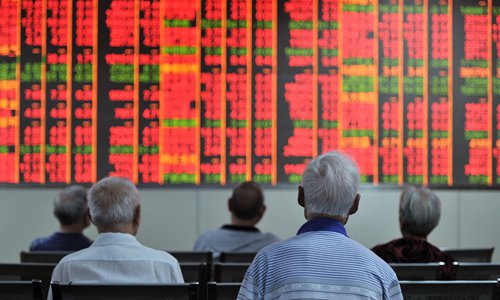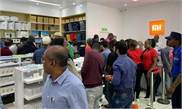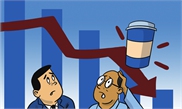Warnings pile up as pandemic hits profits
Companies struggle, small ones fail as shockwave hits economy

Investors check the A-share market at a securities brokerage in Jinhua, East China's Zhejiang Province in July. Photo: VCG
Profit warnings from Chinese companies are piling up as many businesses took a hit in the first quarter, a clear sign that the coronavirus outbreak has sent shockwaves through the world's second-largest economy.
Hong Kong-listed BAIC Motor Corp said Thursday that first-quarter net profit probably fell 95 percent year-on-year, mainly to the virus' impact on the overall automobile sector in China, the Beijing-based automaker said in a filing with the Hong Kong Stock Exchange.
In another sign of the epidemic's fallout, which is deepening a downturn in the world's biggest auto market, Shenzhen and Hong Kong-listed BYD said Tuesday that its first-quarter net profit would fall 79.99-93.33 percent from the prior year, citing a massive slide in its new-energy vehicle sales due to the outbreak and an economic downturn.
Data from the China Association of Automobile Manufacturers showed that total auto production fell 45.2 percent in the first quarter year-on-year while sales shrank 42.4 percent.
Companies in sectors hit hard by the pandemic such as home appliances, consumer electronics, catering and entertainment also warned of their plight.
Shenzhen-listed Gree Electric Appliances, the gold standard in the appliance manufacturing sector, on Wednesday forecast a plunge of 70-77 percent in its first-quarter earnings. Shanghai- and Hong Kong-listed Nanjing Panda Electronics Co last week said it swung to a first-quarter net loss of 40.71 million yuan ($5.75 million), from a year-earlier net profit of 13.46 million yuan.
The electronics manufacturer said first-half earnings will probably plummet 90 percent, owing to intensified industry competition and the virus' impact on its production and operations.
Xi'an Catering, a Shenzhen-listed firm primarily engaged in restaurant and hotel operations and management, booked 45.66 million yuan in net losses in the first quarter, widening from a year-earlier loss of 10.78 million yuan. Film conglomerate Huayi Brothers Media Corp said in a preliminary estimate that it recorded a net loss of 138-143 million yuan in the first quarter.
A handful of companies, mostly in the pig farming, medical and frozen food industries, gained from the coronavirus. Shenzhen-listed pig farming major Muyuan Foods Co said earlier in April that first-quarter earnings would skyrocket 8.39-9.32 fold year-on-year to 4-4.5 billion yuan.
Shijiazhuang Yiling Pharmaceutical Co, whose traditional Chinese medicine Lianhua Qingwen capsules are believed to be effective in containing the COVID-19, expected a spike of 50-60 percent in its first-quarter profits.
Statistics from Chinese corporate database Tianyancha showed, however, that 460,000 companies went bust in the first quarter and about 57 percent of them had been operational for less than three years.
Most of these bankrupt businesses were small and micro-sized.
"Despite the recent pick-up in the back-to-work ratio, the economy has yet to return to normalcy. The recovery momentum will be depressed by weaker external demand, broken supply chains, and volatile financial markets," DBS strategists Nathan Chow and Duncan Tan said in a note sent to the Global Times on Thursday.
Keeping liquidity flowing, the strategists argued, would be crucial to "avoid large-scale bankruptcies and defaults of small and medium-sized enterprises."
The overnight Shanghai Interbank Offered Rate, a gauge of borrowing costs, fell to 0.702 percent on Thursday, its lowest on record. A cut of 20 basis points (bps) in the rate on one-year medium-term lending facility loans to 2.95 percent the central bank offered on Wednesday also took the rate to its lowest in history.
Analysts expected further cuts in the nation's benchmark lending rates to cushion the economic impact of the pandemic.
The one-year loan prime rate stands at 4.05 percent, and the DBS strategists predicted a decline of 60 bps over the course of the year, with the next cut potentially of 20 bps coming on Monday.
"Benefiting from the augmented stimulus package and effective anti-pandemic measures, China's economy is likely to experience a steady recovery in the second half of 2020," Cheng Shi, chief economist at ICBC International, told the Global Times.
He maintained cautious optimism about the bottom line of economic growth and the improvement of economic quality for the entire year of 2020.



